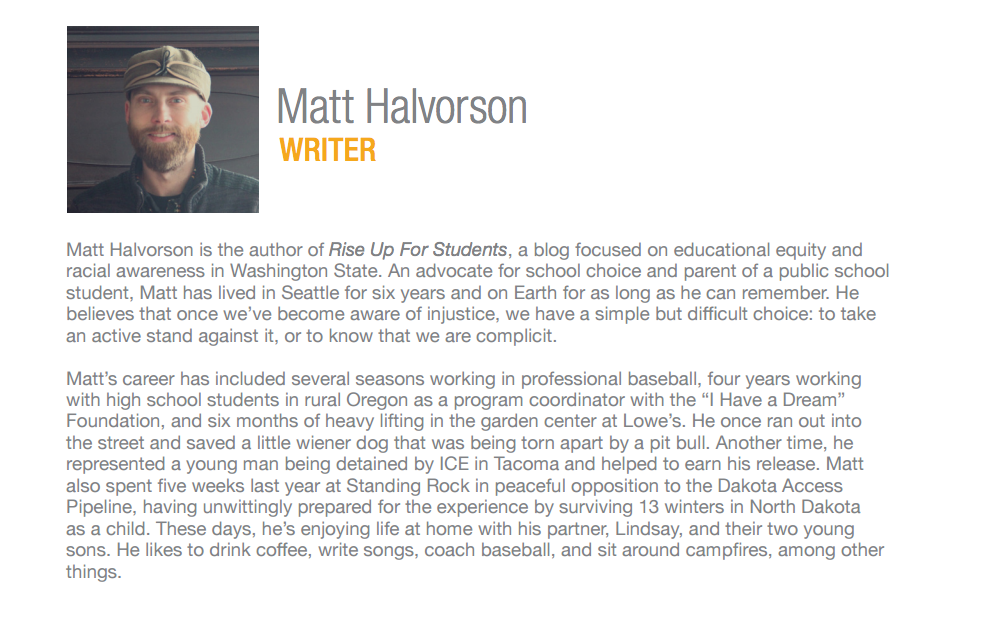Kids get hurt when the adults can’t stop playing with their double-edged swords
/This in-fighting has no end in sight.
While we all agree that our kids are not being treated equally, that our systems do not value us all equally, we labor and argue over exactly how and when and what to change, continuing along each day in the same systems we talk about changing, perpetuating them by our presence.
Along the way, we get distracted. We form opinions and positions. Sides and factions develop. Suddenly, we find ourselves in a little mini-struggle that most people don’t know much about. We in education are debating about the everyday lives and futures of American kids and families, and the in-fighting is costing us time and energy and money that we can’t afford to waste on each other.
For instance, some say that charter schools undermine our public education system. Randi Weingarten, head of our nation’s teachers union, actually said recently that school choice is a “polite cousin” to segregation.
Others of us contend that our public school system has already been undermined by its own failure to adapt, and that we need new and different kinds of public schools. And we remind folks that school choice really just means a belief that parents should be allowed to choose what’s best for their kids.
Things have gotten so twisted up that some folks oppose charter schools for literally the same reasons people open them. It’s weird. It would be funny, actually, except that it’s no laughing matter.
We only first started trying to force schools to integrate in 1954. That’s only 63 years ago. Think of the change in demands on the system between now and 1950. We've needed to find ways to change with it, but we’ve tended to be inflexible, rigid, afraid. Those with privilege have clung to it, resulting in a mostly white teaching force, achievement and opportunity gaps along racial lines, and generations of kids who have grown up in schools that treat them unfairly.
I see charters offering that opportunity to innovate, to consider alternatives, to serve long-neglected students (and when I say charters, I only mean public charters. For-profit charters are corporate nonsense). If we limit our schools only to operating within the same framework they always have, how can we expect them to produce different results?
We can't.
Some decry charter schools as an attempt to privatize our public education system. I suppose that’s got a twisted legitimacy to it, in its way. People are basically asking, why should Bill Gates have so much influence over things?
Well, he shouldn’t — none of us should, unless it happens organically as opposed to financially.
But they’re missing the point: this isn’t Bill Gates’ influence. It’s the influence of many, many advocates and parents and students concentrated and magnified through Gates’ extraordinary wealth and power.
And here’s the extra-twisted-up part: limiting public charter schools actually does more to privatize our system of education as a whole, because you’re working to limit school choice only to those parents who can afford to exercise it. You’re setting up a profitable private school sector to thrive unchecked, and to entice a larger percentage of students than it would if there were more free public school options available.
If you want to keep as many kids in public education as possible, then you have to expand the options. Too many parents are already choosing out for us to pretend this isn’t the case.
Speaking of choosing out, we find another double-sided coin in the debate over standardized tests known as the “opt-out movement.”
Some parents say standardized tests put too great a burden on students. Others say the tests are inherently biased, written and administered in such ways that favor white students and perpetuate gaps.
They might have a point. The creator of the standardized tests himself said, “These tests are too cruel and should be abandoned.”
And on the one hand, yes! We grade and evaluate students from the very beginning as if they are products, conditioning them to judge and compare themselves to each other. We consider whether or not kids have hit our invented benchmarks at the “appropriate” times. We subject kids to hours of monotonous testing that is for the edification of adults, not the kids themselves.
Yet without those tests, we would never have had the evidence we now have of the opportunity and achievement gaps. And how do we measure progress without them? How will we know if those gaps are closing if we do away with the tests? How will we be able to prove (to skeptical white folks, mainly) what most low-income families and families of color already know from experience?
There’s no single solution. Charters, Montessori, home school, traditional public school, outdoor education, project-based learning, whatever. Families need freedom. They need high-quality, free options for their children’s education.
In the end, all the arguments about education are two sides of the same coin. So, maybe it’s something to do with the coin, you know?








